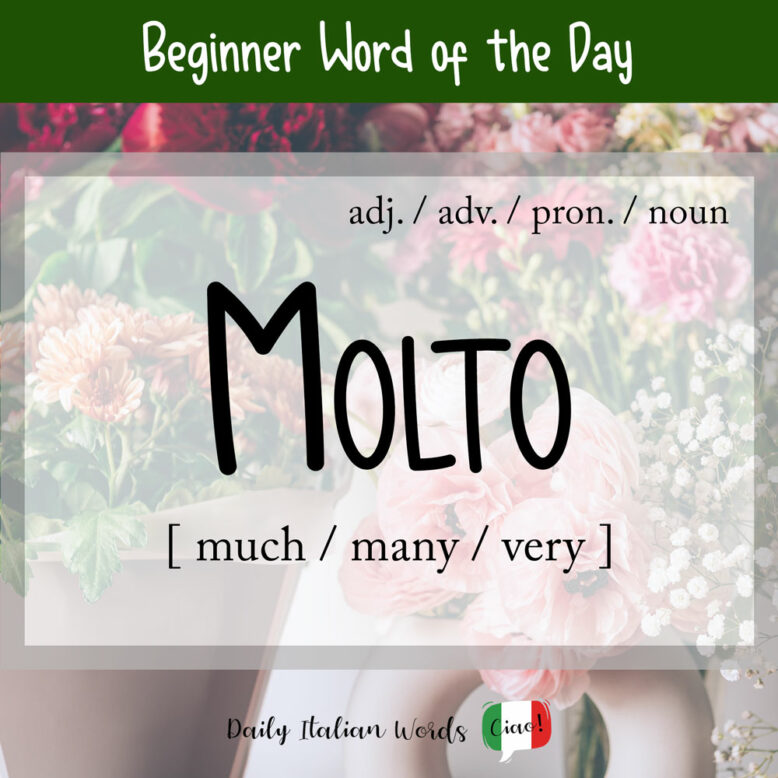One of the first words that will enter your survival vocabulary in Italy is molto (plural: molti | feminine: molta | plural feminine: molte).
It can mean either much or many depending on whether you are referring to uncountable nouns (such as electricity, water or happiness) or countable nouns (such as apples, dogs or cars). A key thing to remember is that molto always comes before the noun.
Non ho molti soldi ma ho molti amici.
I don’t have much money but I have many friends.
Another good translation for molto is a lot which can refer to both countable and uncountable nouns in English.
Conosco molte persone che parlano l’italiano.
I know a lot of people who speak Italian.
Ci vuole molto coraggio per parlare in pubblico.
It takes a lot of courage to speak in public.
Molto can also follow verbs when the meaning is a lot.
Mi piace molto.
I like it a lot.
It can also be used as a pronoun when the noun in question is obvious, just as in English.
Non ho molto da dire…
I don’t have a lot (of things) to say…
Molti hanno cercato il tesoro.
Many (people) have looked for the treasure.

If you want to emphasise molto, you can add the suffix –issimo (absolute superlative) to the end of the word, giving you moltissimo (plural: moltissimi | feminine: moltissima | plural feminine: moltissime).
In English, we don’t have an equivalent to the absolute superlative, so we either have to use submodifiers such as very or extremely to add emphasis or place stress on the words more/much/a lot themselves.
Lui ha moltissimi soldi.
He has a lot of money. (With stress on “a lot”)
Abbiamo avuto moltissima pazienza con lei.
We’ve been extremely patient with her.
Molto can also mean very when it precedes an adjective. For example, if it comes before the word bene (good or well), you get molto bene (very good or very well).
Suoni la chitarra molto bene.
You play the guitar very well.
Caspita, sei molto bravo a ballare!
Wow, you’re very good at dancing!
Questo film è molto interessante, non pensi?
This film is very interesting, don’t you think?
A final variation on molto is in molti. It essentially means the same thing as many in that it can only refer to countable nouns (usually people).
Saranno in molti oggi a salutarti.
Many will greet you today.
In molti usano quel libro per studiare.
Many use that book to study.
Synonyms for ‘molto’ in Italian
- tanto – the two are practically interchangeable; can also become tantissimo
- un sacco – literally a sack; informal
- un mucchio – literally a pile; informal
- una marea – literally a tide; informal
- un casino – literally a chaos; very informal
- una barca – literally a boat; informal
Continue Learning about Other Arts
What does buonissima mean in Italian?
‘Very, very good’ is an English equivalent of ‘buonissima’. The Italian word is the feminine singular form of the superlative. The masculine form for ‘very, very good’ is ‘buonissimo’.
What is the word for quiet for music in Italian?
It is piano, and very quiet is pianissimo
What is the Italian word for ‘no’?
The Italian word for no is no.
What is the Italian word for hunter?
The Word for Hunter in Italian is a Cacciatore. The Word for
Hunter in Italian is a Cacciatore.
Italian word for cheese?
The Italian word for cheese is Formaggio.The Italian word for cheese is «formaggio».
| Term | Symbol | Meaning |
|---|---|---|
| mezzo forte | mf | moderately loud |
| forte | f | loud |
| fortissimo | ff | very loud |
| fortississimo | fff | as loud as possible |
What Italian word means very loud in music?
Forte. (Italian: ‘strong’). A dynamic instruction meaning the music should be played loudly. The instruction appears as either: ‘f’ loud; ‘ff’ fortissimo, meaning very loud; or ‘fff’ very loud.
Which of the following is the Italian word for very very loud in dynamic?
Dynamics
| Italian word(s) | Literal translation | English meaning |
|---|---|---|
| fortissimo | as loud as possible | very loud |
| forte piano | loud soft | loud then immediately soft i.e. an accent |
| forzato or sforzato or sforzando | forced/forcing | accent |
| rinforzando | reinforcing | sudden accent |
What is very loud in music called?
Loud in Music Terms
The musical term for playing loudly is called forte. … The opposite of forte is piano which is the musical term for soft.
Which dynamic symbol means very loud?
The dynamic symbol for loud is called forte (FOR-tay), and looks like the letter f. The dynamic symbol for soft is called piano (Pe-AH-no, the same as the musical instrument) and looks like the letter p. The dynamic symbol for very loud is two forte symbols. This is called fortissimo (for-TEE-see-mo).
What is the Italian term for getting quieter?
Dynamics – volume
| Italian term | Literal translation | Definition |
|---|---|---|
| Calando | quietening | Becoming softer and slower |
| Crescendo | growing | Becoming louder |
| Decrescendo | shrinking | Becoming softer |
| Diminuendo | dwindling | Becoming softer |
What does P MF mean in music?
| pp | pianissimo (very soft) |
|---|---|
| p | piano (soft) |
| mp | mezzo-piano (medium soft) |
| mf | mezzo-forte (medium loud) |
| f | forte (loud) |
What is crescendo in literature?
literarya gradual increase in something. Synonyms and related words. Rates of increase and the process of increasing. increase.
What is the corresponding Italian term for PPP?
[ˌpiːpiːˈpiː] noun abbreviation. (= private-public partnership) accordo con il quale una società privata si impegna a finanziare un progetto pubblico.
What is the Italian word for gradually faster?
Accelerando (accel.) Getting gradually faster Rallentando (rall.)
What are the 4 main properties of musical sounds?
Since sound is a wave, it has all of the properties attributed to any wave, and these attributes are the four elements that define any and all sounds. They are the frequency, amplitude, wave form and duration, or in musical terms, pitch, dynamic, timbre (tone color), and duration.
What is the loudest music note?
Basics
| Basics | Notations | Definitions |
|---|---|---|
| mezzo forte | mf | moderately loud |
| forte | F | loud |
| fortissimo | ff | very loud |
| fortississimo | fff | extremely loud |
What is the loudest dynamic?
Dynamic marking and meaning
| Dynamic marking | Meaning |
|---|---|
| ff | Fortissimo: very loud |
| f | Forte: loud |
| mf | Mezzo forte: fairly loud |
| mp | Mezzo piano: fairly quiet |
What is a dynamic symbol?
The latest release of Illustrator 2015 introduces Dynamic Symbols, which lets you create multiple instances of a master symbol that retain their link to the master symbol even when their shape and visual attributes are altered.
What is the dynamic symbol of crescendo?
Crescendo. Crescendo, abbreviated cresc., is an Italian term that translates as “growing”. In music, this means the music should gradually get louder. A crescendo will either be indicated in a musical passage as cresc. or by the symbol to the left.
What is the importance of dynamics in our daily lives?
Through the use of dynamics, musicians are able to create drama and different intensities throughout a piece, making music fascinating and enjoyable. Dynamics are also used to express certain emotions and moods that musicians want to emphasize towards their audience.

